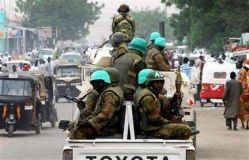Darfur needs long-term peacekeeping force – EU
Jan 13, 2007 (KHARTOUM) — Peacekeepers will be needed in Sudan’s Darfur region years after any political settlement as even the government has created forces it cannot control, a senior European Union official said on Saturday.
 EU special representative for Sudan, Pekka Haavisto, appealed for a ceasefire and said the rebels needed to reach a unified position before any political process could restart.
EU special representative for Sudan, Pekka Haavisto, appealed for a ceasefire and said the rebels needed to reach a unified position before any political process could restart.
“I have a feeling there is a need for a long-term peacekeeping force even if there is a political settlement with the government,” he told reporters in Khartoum.
“Even the government has created forces that it cannot control and this just indicates just how deep the problems are we have in Darfur.”
Some Sudanese officials have said that with a comprehensive peace deal, peacekeepers would not be needed.
Mostly non-Arab rebels took up arms in early 2003 accusing central government of neglecting the remote region.
U.N. officials says Khartoum mobilised proxy Arab militia, known locally as Janjaweed, to quell the revolt.
Experts estimate 200,000 have been killed and 2.5 million driven from their homes in the four years of rape, killing and pillage which Washington calls genocide. Khartoum denies genocide.
The International Criminal Court is investigating suspected war crimes in the region.
Haavisto said the events in Darfur’s main town, el-Fasher, in December, where clashes between militias in the marketplace forced dozens of aid workers to be evacuated, were proof that the government had lost control of some forces.
Haavisto said he had met representatives from the Darfur rebel groups and they had signalled their agreement to restart talks and that the rebel commanders would hold a conference to unite their position.
A U.N. envoy in Sudan this week said government officials had also expressed a need for talks to begin with rebels who had not signed an African Union-mediated peace deal in May.
Only one of three rebel groups signed that deal. Many of those who rejected it formed a new alliance and renewed hostilities with the government.
Haavisto said the government wanted to stick to the May deal, but had shown some flexibility.
“Those issues where I think that flexibility can be shown include compensation, … safe return of refugees, a more serious programme on the disarmament of the Janjaweed,” he said.
Haavisto said the issue of power-sharing would be more difficult in any new talks. And he urged the rebel leaders to come to the table with realistic aims, describing some of the rebel leadership as having their “heads in the clouds”.
Many rounds of negotiations in the past two years have failed because of rebel divisions.
(Reuters)
